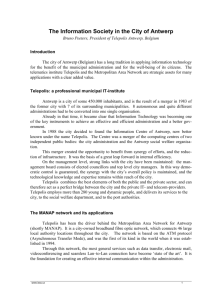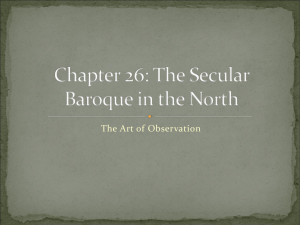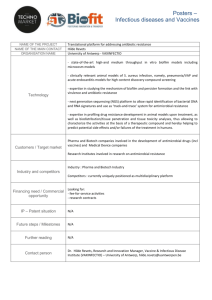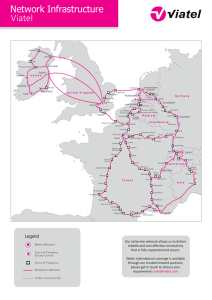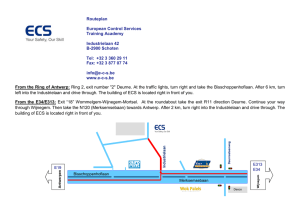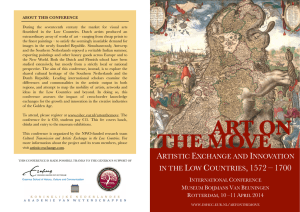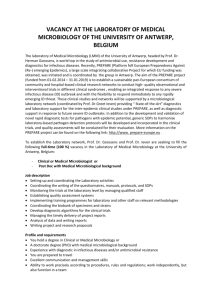Language courses 2014-2015
advertisement
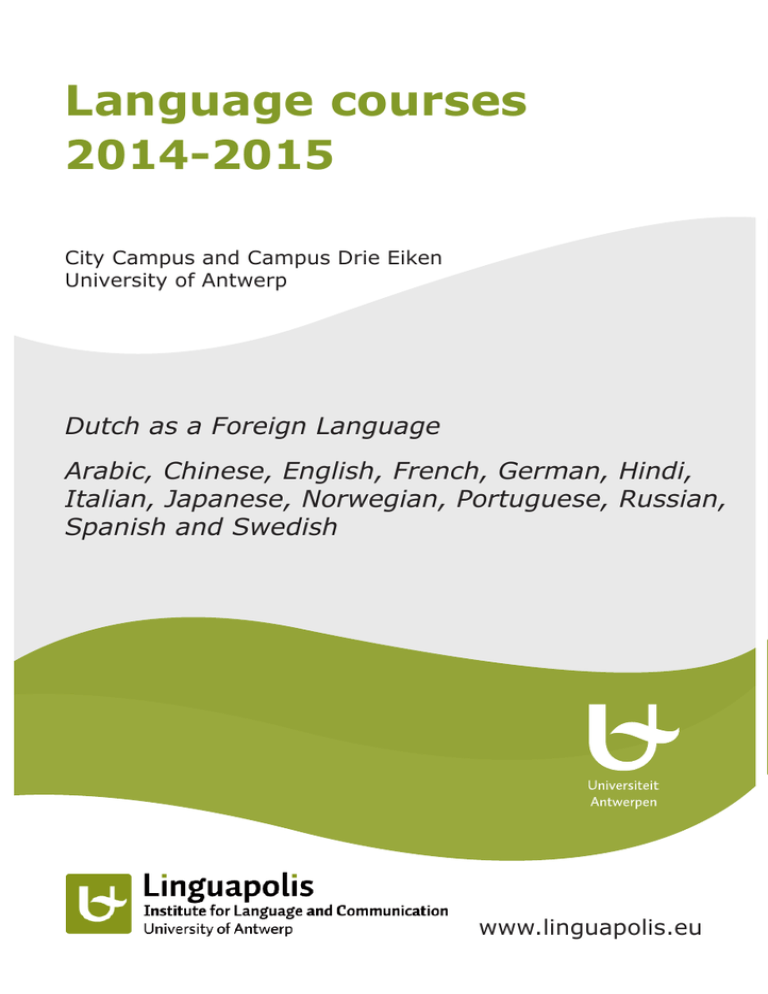
Language courses 2014-2015 City Campus and Campus Drie Eiken University of Antwerp Dutch as a Foreign Language Arabic, Chinese, English, French, German, Hindi, Italian, Japanese, Norwegian, Portuguese, Russian, Spanish and Swedish www.linguapolis.eu www.linguapolis.eu nederlands@linguapolis.be talen@linguapolis.be tel.: +32 3 265 48 03 LANGUAGE COURSES 2014-2015 1. Language courses: programmes and levels 3 2. Expertise in language teaching 4 3. Language in action 4 4. Language courses: programmes 5 5. Language courses: levels 7 6. Conditions of registration 9 7. Calendar 2014-2015 9 8. Information days 9 9. Registration 10 10. Entry test 11 11. Rates 12 12. Payment 13 13. Subsidies 14 14. Paid educational leave 16 15. Cancellation 16 16. Exams and certification 16 17. Extra advantage 18 18.Privacy 18 19. Contact 19 20. Location campuses 20 immersion immersion year course year course intensive trimester course intensive trimester course semester course conversation course This table provides an overview of the course levels of the various language courses on offer. For further details, see the specific language leaflets. immersion 1 LANGUAGE COURSES: PROGRAMMES AND LEVELS 90h 60h 45h 60h 60h 90h 60h 45h 45h CST CST CST CDE CST CST CST CDE CDE Arabic 1 Chinese 1 Dutch as a Foreign Language 1-5 English 1+2 French 1+2 5 1-5 1+2 3-4 1-5 3-6 5-7 1-5 1-6 German 1-3 Hindi 1 Italian 1-3 Japanese 1 Norwegian 1-2 Portuguese 1-2 Russian Spanish 5+ 1 1+2 1 Swedish 1-5 1-2 CDE: Campus Drie Eiken CST: City Campus 1+2: combined level 5+: from level 5 22/09/2014 – most recent version of the brochure: www.linguapolis.eu -3- 2 EXPERTISE IN LANGUAGE TEACHING LINGUAPOLIS represents over 25 years of experience in language teaching. As an institute within the University of Antwerp, we are uniquely able to combine practical experience with academic insight. LINGUAPOLIS thus applies a coherent didactic method and is committed to continuous quality care and improvement in the fields of language teaching, research and testing. Qualified and experienced teachers All our teachers are native or near-native speakers and hold a university degree and teaching certificate. They participate regularly in conferences, seminars and workshops to keep abreast of state-of-the-art language teaching which they subsequently integrate into the courses. 2014-2015 programme LINGUAPOLIS offers Language Courses in 14 languages at the City Campus in Antwerp and/or at Campus Drie Eiken in Wilrijk. (see 1. Language Courses: Programmes and Levels) More detailed information on the content, the materials, the start and end dates of all language courses can be found in the language leaflets. 3 LANGUAGE IN ACTION Active and communicative Our approach to language teaching is communicative, interactive and task-oriented. We take care to ensure that there is continuous interaction between all the students and we in turn expect you to participate actively in class. We provide maximum speaking opportunities through numerous practice-oriented and functional language tasks. Classroom teaching is combined with assignments in groups or pairs. Efficient and competency-focused We train you in five language skills: reading, listening, writing, speaking and effective communication. The target language of the course is also the language of instruction. The pace of our language courses is fast: you are required to absorb a lot of information in a short span of time. Consequently, you must process the course material before and after classroom sessions through self-study and distance learning. You are also expected to train your language skills independently. -4- Formal accuracy Besides focusing on the communicative aspect of language, we also pay attention to the formal accuracy of your usage: your speech and writing must be grammatically correct, so that your audience is able to understand you without strain or effort. As such, we prepare you for the strict language requirements imposed upon the highly-qualified in public life, during your studies and at work. Varied teaching methods We combine the best approaches from old and new teaching methods to ensure that you are able to study aspects of the target language in the manner that most appeals to you. Homogeneous groups All course participants are highly qualified and have a comparable level of proficiency in the target language. New students with prior knowledge have to take an entry test, so that the courses can be organized in an efficient, interactive and qualitative way. (see 10. Entry test) Learning result and learning pleasure Our teaching approach offers a framework whereby the constant interaction of learning result and learning pleasure is aimed at. Both objectives are the driving forces that enable you to develop your language skills to the fullest. 4 LANGUAGE COURSES: PROGRAMMES IMMERSION In this course, you acquire or improve your language skills very quickly. An extra-intensive approach requires a substantial time investment, but it also guarantees fast results. 90 hours - 1 month - fulltime 1 hour of class = 0.5 hours of self-study This course exists for English level 1+2, French level 1+2, Spanish level 1+2 and for the courses Dutch as a Foreign Language levels 1-5 Higher Education Perspective. 60 hours - 3 weeks - fulltime 1 hour of class = 0.5 hours of self-study In September the immersion course Dutch as a Foreign Language level 5 Higher Education Perspective has fewer hours taught over a shorter period so that it is even more intensive (60 hours – 3 weeks – fulltime). -5- 45 hours - 2 weeks - fulltime 1 hour of class = 0.5 hours of self-study These immersion courses have the same number of class hours as the semester courses. The intensity of the course, in which the students are immersed in the language during 2 weeks, makes it possible to reach the same learning objectives. This formula is ideal for students with a basic knowledge of French who want to improve their language skills during the holidays. Doing an immersion course is also a good opportunity for students who are preparing for studies abroad or who want to improve their language skills with a view to their future studies, personal development and/or professional career. This course exists for French (level 3 and 4). YEAR COURSE 60 hours - 30 weeks - 1 evening per week 1 hour of class = at least 1 hour of self-study If you want to take up the challenge of learning a foreign language with a non-Latin script, you can register for a year course, which will be interesting and varied. In the course of an academic year you will have one intensive class per week. During this year you will be able to learn and experience the basics of the language in its culture. This course exists for Arabic, Chinese, Hindi, Japanese and Russian (no prior knowledge necessary). INTENSIVE TRIMESTER COURSE 90 hours - 10 weeks - 3 sessions per week 1 hour of class = 0.5 hours of self-study A high frequency of classes guarantees speedy progress, so that you are able to apply what you have learnt immediately. During the academic year, we organise intensive daytime and evening courses of 10 weeks. This course exists for Dutch as a Foreign Language levels 1-5 Higher Education Perspective and English levels 1+2. INTENSIVE TRIMESTER COURSE 60 hours - 10 weeks - 2 evenings per week 1 hour of class = 0.5 hours of self-study Semester courses (see below) require some self-discipline as they involve extensive self-study. Participants who prefer more teacher guidance, opt for two sessions a week. This course exists for English levels 3-6, French levels 1-5 and Spanish level 1. -6- SEMESTER COURSE 45 hours - 15 weeks - 1 evening per week 1 hour of class = at least 1 hour of self-study Ideal for participants with a busy agenda and for (exchange) students. Semester courses are spread out over a longer period of time, so that there is just one class per week. This approach involves a substantial amount of self-study to prepare optimally for the practical classroom exercises. This course exists for Dutch as a Foreign Language levels 1-5 Professional Perspective, English levels 5-7, French levels 1-6, German levels 1-3, Italian levels 1-3, Norwegian levels 1-2, Portuguese levels 1-2, Spanish levels 1-5 and Swedish levels 1-2. CONVERSATION COURSE 45 hours - 15 weeks - 1 evening per week 1 hour of class = 0.5 hours of self-study During the academic year, we organise conversation courses for students with a thorough prior knowledge. The course focuses on developing and practising communicative skills and enriching and expanding vocabulary. Grammar is not an explicit part of the course; however, persistent problems will be remedied. The use of authentic texts, film extracts and music gives students a real taste of the language, culture and society. This course exists for French (after level 5). More detailed information on the content, the materials, the start and end dates of all language courses can be found in the language leaflets. 5 LANGUAGE COURSES: LEVELS LINGUAPOLIS offers courses in European languages at different competency levels. For a description of these levels and how they fit into the Common European Framework of Reference for Languages (CEFR), see the specific language leaflets. The CEFR specifies the level of competency that learners of a language have attained: A language user at A1 level Can understand and use familiar everyday expressions and very basic phrases aimed at the satisfaction of needs of a concrete type. Can introduce himself/herself and others and can ask and answer questions about personal details such as where he/she lives, people he/she knows and things he/she has. Can interact in a simple way provided the other person talks slowly and clearly and is prepared to help. -7- A language user at A2 level Can understand sentences and frequently used expressions related to areas of most immediate relevance (e.g. very basic personal and family information, shopping, local geography and employment). Can communicate in simple and routine tasks requiring a simple and direct exchange of information on familiar and routine matters. Can describe in simple terms aspects of his/her background, immediate environment and matters in areas of immediate need. A language user at B1 level Can understand the main points of clear standard input on familiar matters regularly encountered in work, school, leisure, etc. Can deal with most situations likely to arise whilst travelling in an area where the language is spoken. Can produce simple connected text on topics which are familiar or of personal interest. Can describe experiences and events, dreams, hopes and ambitions and briefly give reasons and explanations for plans and opinions. A language user at B2 level Can understand the main ideas of complex text on both concrete and abstract topics, including technical discussions in his/her field of specialisation. Can interact with a degree of fluency and spontaneity that makes regular interaction with native speakers quite possible without strain for either party. Can produce clear, detailed text on a wide range of subjects and explain a viewpoint on a topical issue giving the advantages and disadvantages of various options. A language user at C1 level Can understand a wide range of demanding, longer texts, and recognise implicit meaning. Can express fluently and spontaneously without much obvious searching for expressions. Can use language flexibly and effectively for social, academic and professional purposes. Can produce clear, wellstructured, detailed text on complex subjects, showing controlled use of organisational patterns, connectors and cohesive devices. (Source: Common European Framework of Reference for languages) -8- 6 CONDITIONS OF REGISTRATION Our courses are intended for highly-educated adults. This means that: - you must be at least 18 years of age; and - you must hold a secondary school diploma (i.e. you have received at least 12 years of education) and you are studying or have studied at higher education level; and - you must previously have studied another European language as a foreign language. 7 CALENDAR 2014-2015 There are no courses during school holidays and on public holidays. SCHOOL AND PUBLIC HOLIDAYS IN 2014-2015 Autumn mid-term: 27 October - 31 October 2014 Christmas Holidays: 22 December 2014 - 2 January 2015 Spring break: 16 - 20 February 2015 Easter Holidays: 6 - 17 April 2015 11 November 2014 1 May 2015 14 and 15 May 2015 25 May 2015 20 and 21 July 2015 8 INFORMATION DAYS Information days will take place on: - Tuesday 23 September 2014, Campus Drie Eiken, Block R, Universiteitsplein 1, from 12 noon to 7pm (for semester & year courses starting in the week of 6 October 2014) - Thursday 25 September 2014, City Campus, Scribani building, Prinsstraat 10, from 12 noon to 7pm (for trimester courses starting on 2, 3, 6 or 7 October 2014) - Monday 5 January 2015, City Campus, Scribani building, Prinsstraat 10, from 12 noon to 7pm (for trimester courses starting on 12 or 13 January 2015) -9- - Wednesday 11 February 2015, Campus Drie Eiken, Block R, Universiteitsplein 1, from 12 noon to 7pm (for semester courses starting in the week of 2 March 2015) - Monday 30 March 2015, City Campus, Scribani building, Prinsstraat 10, from 12 noon to 7pm (for trimester courses starting on 20 and 21 April 2015) 9 REGISTRATION 1.Online registration is possible for all LINGUAPOLIS courses via www.linguapolis.eu. Click on the language (course) you are interested in and then choose ‘Online registration’. 2.You can also register at the LINGUAPOLIS secretary’s office. The opening hours can be found under 19. Contact. Students of Dutch with a scholarship from Huis van het Nederlands hand in their referral at the LINGUAPOLIS secretary’s office. 3.On the information days you can find out about LINGUAPOLIS, meet our teachers, have a look at the textbooks, register and do an entry test (see 10. Entry Test). Important 1.New students register for a language, not for a level (unless you are level 1 or level 1+2). Your level will be determined by means of the entry test (see 10. Entry Test). 2.Registration is only valid upon receipt of payment. Registration is only complete if you have taken both entry tests (oral and written) before or on the information day (not for level 1 or level 1+2). Valid and complete registrations always take priority over registrations that are incomplete. 3. The number of places on each course is limited. If a course is full, you can register on a waiting list (WL). 4.For all trimester, semester and year courses the final registration day is the information day. You can find the final registration date for all the other courses on the language leaflet. - 10 - 10 ENTRY TEST Registration without entry test 1.Beginners, starting at level 1 or level 1+2, can register without having to do an entry test. 2. Students who want to register for a year course for Arabic, Chinese, Hindi, Japanese or Russian, don’t need to have prior knowledge and can register straight away. 3.Those holding a LINGUAPOLIS certificate for the preceding course level that is not older than one year may enrol without taking the entry test. Registration with entry test When do you need to do an entry test? 1.If you are a new LINGUAPOLIS student and if you already have some knowledge of the language through previous study or experience you have to take the entry test. 2.You will also have to do the entry test if you have a certificate from another language school. 3.If your LINGUAPOLIS certificate was issued more than a year ago, you will have to do the entry test. How do you enrol for an entry test? In all three cases above you fill in ?-level on the online registration form or you can contact the LINGUAPOLIS secretary’s office. The secretary will send you further information about the entry test. Important The entry test is a key feature in LINGUAPOLIS’ striving for quality. It is a free service to make sure you start in a level suited for you. The entry test is led by experienced language advisers. By organizing the test professionally LINGUAPOLIS can guarantee a quality course taught at a high pace. The entry test consists of a written and oral part. The written part tests your knowledge of the language. The results of this test are compared to the learning objectives at the beginning and end of the different levels. In the oral part you will have a conversation in the target language. By asking you questions about yourself, your motivations and expectations, the language adviser will check which level of speaking you have. The results of both parts are put next to each other, compared and analysed. This process enables LINGUAPOLIS to place you in the appropriate level.H PACE. - 11 - 1.You can only take an entry test after full payment of the course registration fee. 2.The entry test is included in the registration fee and inextricably bound up with the registration. You cannot do the entry test on its own. 3. The results of the entry test are binding. 4.The result of the entry test remains valid for one year. 5.LINGUAPOLIS will provide you with all necessary information about the assessment. 6. You are expected to do the entry test on your own and take it seriously. 11 RATES All rates include course materials, textbooks, multimedia and the entry test (if applicable). Contact hours Full rate Reduced customer rate, UA-alumni, staff AUHA and UZA AUHA-student, UA-PhD student and OCMW 45 hours € 395 € 340 € 275 60 hours € 475 € 435 € 365 90 hours € 545 € 495 € 485 For a number of language courses you can get a reduction; certain LINGUAPOLIS-students can apply for a discount. For further information see 13. Subsidies. Full rate You pay the full rate for the first course only. For all subsequent courses, you are entitled to a reduced customer rate. Reduced customer rate, staff AUHA and UZA, UA-alumni When you enrol for the second time you pay a reduced customer rate. This rate is only given to individuals (not companies). Staff of the Antwerp University Association (AUHA), of the University Hospital of Antwerp (UZA) and alumni of the University of Antwerp (UA) are entitled to a reduced customer rate from the first time they enrol. In order to claim the reduced rate, you must provide your staff ID card or - 12 - the Clubkaart (alumni). Alumni of the University of Antwerp can apply for the free Clubkaart via www.uantwerpen.be/alumni. AUHA-student, UA-PhD student and OCMW Students of the following institutions get a reduced rate from the first enrolment: - students of the Antwerp University Association (AUHA): - University of Antwerp - Antwerp Maritime Academy - Artesis Plantijn University College Antwerp - Karel de Grote-University College When enrolling or attending your first class, you must provide a student ID card. - PhD students of the University of Antwerp You can use your DOCOP educational credit to cover the registration fee. Check in advance whether you have sufficiant credit left. For more information: www.uantwerpen.be/antwerpdoctoralschool. - social assistance recipients When enrolling you must provide a document from the welfare centre (OCMW) stating that you are a social assistance recipient. 12 PAYMENT A registration will only be considered valid upon receipt of payment. -You can transfer the registration fee into bank account number IBAN BE65 7350 0931 3196 BIC KREDBEBB. Please mention the course code (see the language leaflet) and the name of the course participant. -You can pay by debit card (Bancontact) or credit card (Visa or Mastercard) during the information days or at the LINGUAPOLIS secretary’s office. -PhD students of the University of Antwerp can use their DOCOP educational credit to cover the registration fee. Check in advance whether you have sufficient credit left. For more information: www.uantwerpen.be/antwerpdoctoralschool. - Students of Dutch with a scholarship from Huis van het Nederlands hand in their referral at the LINGUAPOLIS secretary’s office. - Incoming exchange students of the University of Antwerp who have registered for a Dutch course hand in their vouchers at the LINGUAPOLIS secretary’s office. - 13 - Important 1.Those who have to do an entry test pay the registration fee before doing the test. 2.The information day is the final registration date for all trimester, semester and year courses. (For the information day dates: see 9. Registration) 3. You can find the final registration date for all the other courses on the language leaflet. 13 SUBSIDIES KMO-portefeuille The KMO-portefeuille is a measure for subsidizing Flemish SMBs and professions. Through KMO-portefeuille it is possible to get subsidies for training courses that are organised by certified service providers, such as LINGUAPOLIS (number DV.O100322). For more information: www.kmoportefeuille.be Training vouchers LINGUAPOLIS can only accept training vouchers for the courses of Dutch as a foreign language. Employees can apply for training vouchers from vdab.be/mijnloopbaan. With these vouchers, you can save up to half of the registration fee for your Dutch course. If you have not received the vouchers before the start of the course, then pay the registration fee from your own pocket. As soon as you hand in the vouchers to LINGUAPOLIS, we shall refund you as quickly as possible. Course subsidy through your joint committee As employee you can ask for a course subsidy through your joint committee. The joint committee for employees, CEVORA (ANPCB or PC218) for example, provides up to 100 euros financial support annually, regardless of the amount of courses taken. For more information: www. cevora.be/opleidingspremies. Are you a member of another joint committee? Go to www.werk.belgie.be to find out more or contact your company’s human resources office. - 14 - Subsidies for exchange students (Erasmus,...) Outgoing students from the Antwerp University Association (AUHA) can apply for a financial grant from the University or the University College to take a language course in preparation of a stay abroad. Procedure 1.Before the beginning of the course you pay the rate (for students) for the language course you would like to take; 2.At the end of the course you get a proof of attendance or a certificate; 3.Take your proof of attendance or certificate to the International Relations Office of the University of Antwerp or of your University College; 4.The International Relations Office will pay back the foreseen subsidy after your stay abroad. Important 1. 2. The subsidy is only valid when taking a LINGUAPOLIS course in the language of the country you will be staying at and taking part in an exchange programme of minimum three months. LINGUAPOLIS will only hand out the proof of attendance to students who attended classes regularly (present at least 80% of the time) and who took part in the (mid-term) test. For detailed information on the rates and conditions, go in advance to the International Relations Office of the University of Antwerp or of your University College: Students of the University of Antwerp International Relations Office Stadscampus, Gratiekapelstraat 10, 2000 Antwerpen outgoingstudents@uantwerpen.be - Students of Karel de Grote-University College www.kdg.be/international/international-office - Students of Artesis Plantijn University College www.ap.be Voucher of the University of Antwerp When you are an incoming exchange student of the University of Antwerp you can get a one-off voucher for the Dutch as a foreign language course. The voucher covers 70% of the registration fee. For the exact information you need to contact the International Relations Office of the University of Antwerp: Stadscampus, Gratiekapelstraat 10, 2000 Antwerpen, incomingstudents@uantwerpen.be - 15 - 14 PAID EDUCATIONAL LEAVE All LINGUAPOLIS Dutch as a foreign language courses qualify for paid educational leave for workers in the private sector (for information see www.werk.belgie.be). If you think you qualify, please contact the LINGUAPOLIS secretary’s office (nederlands@linguapolis.be or +32 3 265 48 03). 15 CANCELLATION If there are fewer than 14 registrations for a particular course, LINGUAPOLIS reserves the right to cancel classes. In such an event, we shall refund your registration fee in full as quickly as possible. Important You may cancel your registration up to the start of the classes. In such an event, we charge 20% of the registration fee to cover cancellation costs. The € 35 fee for your entry test shall not be refunded. Once a course has started, no refunds can be made. Registrations cannot be interrupted or transferred to a later course date. 16 EXAMS AND CERTIFICATION You receive a certificate from the University of Antwerp, LINGUAPOLIS, Institute for Language and Communication, on condition that you have attended at least 80% of classes and have taken the reading, listening, writing and speaking exam. For the European languages the certificate levels correspond with the Common European Framework of Reference for Languages (CEFR). You can find an overview on the separate language leaflets. If you fail, you will be unable to move on to the next level. If you so wish, you may take the exam again. In order to be eligible for such a re-sit, you must respect a minimum period of one month of self-study. The resit exams are on fixed dates; register for the re-sit at least two weeks in advance at the secretary’s office. The re-sit fee of € 35 must be paid on the day of your registration; no postponement of payment is allowed. - 16 - The secretary will send you further information about the re-sit at the end of the course. Conversation courses involve no final exams. You receive a proof of attendance at the end of the course, on condition that you have attended at least 80% of classes. For the foreign languages with a non-Latin script (Arabic, Chinese, Hindi, Japanese and Russian) the agreements about the exam and certificate are different. You will get more information at the beginning of the course or at the Linguapolis secretary’s office. Taking a resit exam for these languages is not possible. Important for AUHA students 1.Some study programmes award academic credits for LINGUAPOLIS courses. Please contact your faculty secretary’s office in advance for more detailed information and all conditions. Some faculties do not accept the language courses as a part of their curriculum or they do not agree with the suggested number of credits. In the table below you will find the usual number of credits awarded: Immersion 90 hours 6 credits Intensive trimester courses 90 hours 6 credits Intensive trimester courses 60 hours 5 credits Year courses 60 hours 5 credits Semester courses 45 hours 4 credits Immersion 45 hours 4 credits The conversations course is not eligible for credits. 2.Outgoing exchange students (Erasmus or other exchange programmes) from the Antwerp University Association (AUHA) need a proof of attendance or a certificate in order to apply for a subsidy (see 13. Subsidies for outgoing exchange students). - 17 - 17 EXTRA ADVANTAGE LINGUAPOLIS students can obtain a UAntwerpen Plus Pass for € 25. The UAntwerpen Plus Pass gives you one-year access to the sports and cultural activities on offer at the University of Antwerp and associated colleges (until the end of August 2015). LINGUAPOLIS students can register at http://uantwerpenplus.be as a former student (alumnus) of the University of Antwerp. There is no need to provide a rolnummer. Further instructions can be found on the website. 18 PRIVACY Now and then LINGUAPOLIS takes photographs or records videos of class activities. These films or photos are used for the LINGUAPOLIS or University of Antwerp website only. If you don’t want to be photographed or filmed, you can state this at the moment of photographing/filming. - 18 - 19 CONTACT by e-mail Dutch as a Foreign Language nederlands@linguapolis.be for the other languages talen@linguapolis.be by telephone during office hours, call + 32 3 265 48 03 by fax call + 32 3 265 46 37 via the website for all information & online registrationE www.linguapolis.eu at the secretary’s office You can also visit the secretary’s office for further information or for registration. Kleine Kauwenberg 12 2000 Antwerp Opening hours secretary’s office Monday Tuesday Wednesday Thursday Friday 9am-1pm 9am-1pm phones are open phones are open phones are open phones are open phones are open 1pm-5pm 1pm-5pm phones are open 5.30pm6.30pm During the Christmas and Easter holidays and in July and August the secretary’s office will be closed on Monday evenings. - 19 - 20 LOCATION CAMPUSES City Campus The courses on the City Campus take place in and around Prinsstraat. Please note that parking space is very limited. For a detailed route description, by car or by public transport, visit www.uantwerpen.be/routedescription. Due to the shortage of classrooms at the City Campus the LINGUAPOLIS morning and immersion courses (Dutch as a Foreign Language) may occasionally be taught at one of the other campuses of the University of Antwerp (Campus Groenenborger, Campus Middelheim or Campus Drie Eiken). All campuses can easily be reached by public transport. We apologise for any inconvenience this may cause. - 20 - Campus Drie Eiken The courses take place at Campus Drie Eiken, at Universiteitsplein in Wilrijk. In the evening you can easily find a free parking place near the classrooms here. For a detailed route description, by car or by public transport, visit www.uantwerpen.be/routedescription. - 21 -
